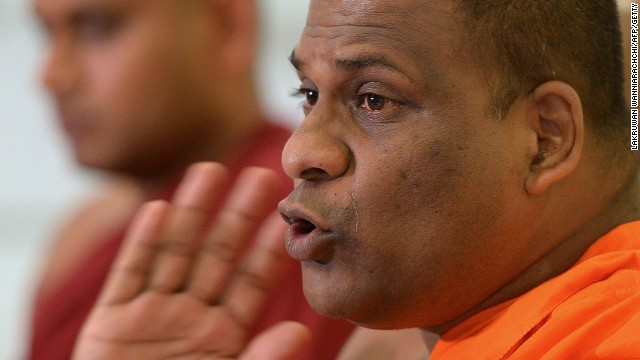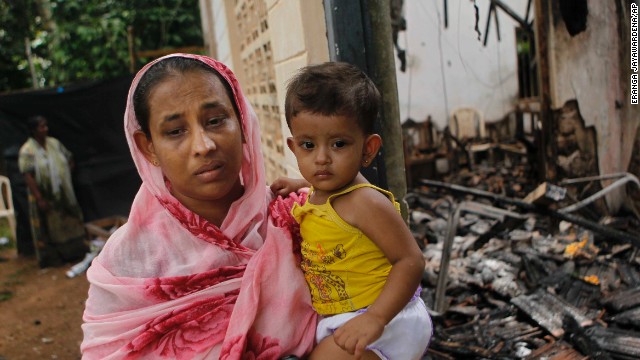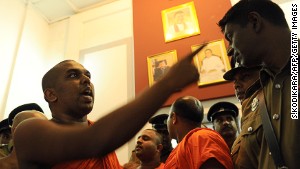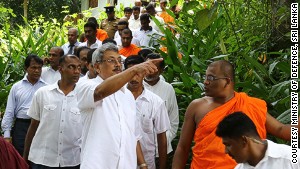July 17, 2014, 10:20 pm
By A. M. Jazeel, Addalaichenai Corr.
Islamic Religious Education Mission, in a letter sent to President Mahinda Rajapaksa alleges that the allocation of Hajj quotas to the travel agents this year has been done in a fraudulent manner.
It has suggested that the quotas should not be limited to Muslim travel agents and others must also be allowed to organise Hajj pilgrimages.
The mission also alleges that Hajj committee has failed to be of any use to Hajj pilgrims; both Hajj Committee and the Department of Muslim Cultural Affairs do not care about the pilgrims’ grievances and welfare and they have taken no action against errant travel agent even though there are written complaints from pilgrims.
Secretary of the Mission Abdul Hassan alleged that some influential persons in the Muslim Community and certain travel agents were earning millions of rupees in the month of Hajj by exploiting pilgrims.
Secretary, Ministry of Buddha Sasana and Religious Affairs, contacted for comment on the failure of the Department of Muslim Religious Affairs to inquire into complaints against the errant travel agents, admitted that there were certain shortcomings in the department and undertook to look into them and take remedial action.
http://www.island.lk/index.php?page_cat=article-details&page=article-details&code_title=106933
July 17, 2014, 12:00 pm

By Harim Peiris
The Bodu Bala Sena (BBS), Sri Lanka’s catalyst for opening up a new Buddhist verses Muslim conflict, perhaps due to boredom now that a thirty year civil war has ended, follows more by design than accident a classic military strategy of an escalation or advancement and then a tactical retreat due to over reach. Immediately after the previous attacks as well, whether in Dambula or Nugegoda, there was silence for awhile and similarly after the anti Muslim events of "Dark June 2014", there has been a steady denial both by the state security establishment and the extremist perpetrators of responsibility for the violence, the former denying connivance and the latter denying instigation. Both want to blame a spontaneous mob.
Sri Lankan society unequivocally condemns Political leaders, both those allied with the government and the opposition have taken aim at the BBS as an extremist group bent on violence against religious minorities, both Muslims but also Christians. The Government’s own ministers ranging from Rishard Bathuideen to Vasudeva Nanayakkara and including such stalwarts as DEW Gunasekera and Tissa Vitharana have been unequivocal in their condemnation of the BBS. The main opposition UNP, through its media spokesman former minister Mangala Samaraweera has directly held the state intelligence agencies responsible for support to the BBS, while the UNP’s area MP for Beruwela and Aluthgama, Palitha Thewaperuma has also alleged police cover up. Lawyers have alleged that the JMO is falsifying evidence regarding the deaths of the three Muslim persons, claiming stab wounds, when they were actually gunshot injuries, raising the question as to who carried guns that day. The Bar Association has formally lodged a complaint with the Attorney General’s department regarding the BBS and understandably the ethnic minority parties are even more concerned, with Minister Rauff Hakeem a publicly troubled man and TNA leader R.Sambanthan condemning the anti Muslim violence. Even President Rajapakse felt compelled to visit the victims, talk vaguely of compensation and thereafter claim, quite correctly, that the true Buddhist path was both moderate and non violent. Clearly the Sri Lankan polity is reacting negatively to the Aluthgama and Beruwela violence and the response has been two fold. Firstly the standard blanket denials, lacking much credibility but now more insidiously, a rationale for the violence.
The Dalada Maligawa attack did not enrage mobs The General Secretary of the BBS in a full page interview in a leading national newspaper, on Wednesday 16th July has sought to articulate what in essence is an excuse for not just the violence which occurred but also possibly lay the ground work for future violence. Firstly the ethics of giving extremist groups, the oxygen of free publicity and the veneer of respectability through media interviews, is itself an issue which should be avoided, given that Deputy Minister Faizer Mustapha is on record stating that the media should bear some responsibility for the rise of extremist groups, due to giving them undue prominence and free publicity. They are also intolerant, even of other monks, voicing contrary views and attack their press conferences
In the interview, the BBS chief states that a mob became incensed due to an alleged assault on a Buddhist monks, three days prior to that. However, mobs get enraged spontaneously and immediately, not after a three day cooling off period, unless instigated and orchestrated thereafter. The alleged assault on the monk or his driver over a traffic altercation was anyway before the courts. So the BBS rally was a contempt of court, since it was about a matter pending before courts.
Moreover, the gravest and most dastardly, cowardly and utterly contemptible attack of all time on the religious traditions of our country and society was the Dalada Maligawa attack by the LTTE. However, to the credit of Sri Lanka and her then leaders, there was no anti-Tamil pogroms or a repeat of Black July’83, the folly of attacking civilians for a terrorist outrage had been learned. Highly unlikely that a traffic altercation unlearns those lessons without a lot of help .
A possible ground work for future violence
The most troubling aspect of the BBS rationale for the violence of the past, is the ground work that it lays for further violence. Firstly is the claim that there are Muslim extremists and that it is these forces should be examined. The staunchly pro government National Shoora Council and the All Ceylon Jamaiyyatul Ulama are the BBS definition of extremist. Even if one considered some unknown Muslim activist groups in the East, there activities are not violent. Just perhaps fervent in religious belief and practice. As one young social media activist put it quite simply after Aluthgama "some people seem more interested in fighting and killing for their religion than in practicing its teachings and precepts".
The other rationale for further violence lies in the premise, advanced by the BBS, that Sinhala Buddhists face threats from the other minority religious groups, the government is doing nothing about it and hence this may lead to further violence. Now the theory that Sinhala Buddhism is under siege, rather than progressing has been a thesis argued in the political arena especially by the JHU and also the NFF. Especially during the Rajapaksa presidency this message has just not resonated with the public. It is hard to imagine or portray President Mahinda Rajapaksa as being a betrayer of Sinhala Buddhists in anyway. On the contrary, both the Tamil and Muslim communities, through their voting behavior clearly see his administration as hostile to them. Conversely the JHU and the NFF, which have been raising alarm bells about threats to Sinhala Buddhism has fared very poorly at the recent provincial polls. A message that does not resonate with voters, is now being touted by the BBS as the rationale for violence.
http://www.island.lk/index.php?page_cat=article-details&page=article-details&code_title=106919
















